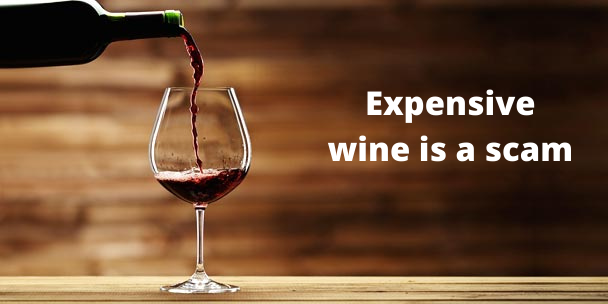http://youtu.be/1_8lfIA7Dz8
My wine budget allows me to buy wines that cost between $10 CAN to $15 CAN. I never spend more than that. I bring them to house parties where some of the better off people bring wines that costs about $50 CAN. No one can tell the difference. No one can tell which which wine is better.
So are we all wasting our money when we buy more expensive wine?
My answer is: YES!

When I taste this Cabernet Sauvignon, 2003, what am I tasting? The grapes? The tannins? The oak barrel? or the price?
I have a question. When you have two bottles of wine, one costs $50 and the other one costs $10. Is the $50 bottle five times better than the $10 bottle? or is it better at all?
Brian Dimarco, a well-respected wine distributor, presented random participants with two bottles of wine, each containing the exact same wine. They were told that one bottle was worth $50 and the other was worth $10.
After the participants tasted the two bottles, all the participants agreed that the $50 bottle tasted better.
But of course, those were amateurs. What do they know? They were confused by the price label. Certainly, experts would not make that mistake. Or would they?
Since many of us don’t have enough knowledge to judge expensive wine from cheap wine, we rely on the expertise of writers from magazines like “Wine Spectator.” Not only do they taste each individual wine and give us their opinion but they also review the wine list of many restaurants and tell us which restaurants have the best wine lists. Or do they?
This was the question posed by writer and researcher Robin Goldstein.
In August 2008, Mr. Goldstein created a fake restaurant in Milan, Italy, called Osteria L’intrepido. He created a fake menu, a fake website, and a fake voicemail message saying that the restaurant was closed for vacation.
As for the wine list, Goldstein made that up too. He chose several wines which had received low ratings from this magazine, Wine Spectator.
Mr. Goldstein sent all this fake information to the magazine and a real money order for $250 for the registration fee. What he wanted to test was whether you had to have a good wine list to win an award of wine excellence? Well, to the surprise of Mr. Goldstein, he did win the award of excellence and he was pitched to buy advertising in the magazine next to the award in the following issue of the magazine.
Ok, they were biased because they wanted to make some money, but real experts would not make that mistake, or would they?
In 2001, Frederic Brochet, from the University of Bordeaux, invited 57 wine experts to evaluate two wines, one red and one white.
The experts described the red wine as: “Intense, deep, and spicy.” while the white wine was described as “lively, fresh, and floral.” It turns out that they were drinking exactly the same wine. They were both white wine, except that the red was, in reality, white wine with a red colorant.
It is my belief that when you buy an expensive bottle of wine, you are buying a cheap bottle of wine packaged with a good story around it. My advice for you is to buy a cheap bottle of wine plus a movie or a good book and you will be getting much better value for your money.
